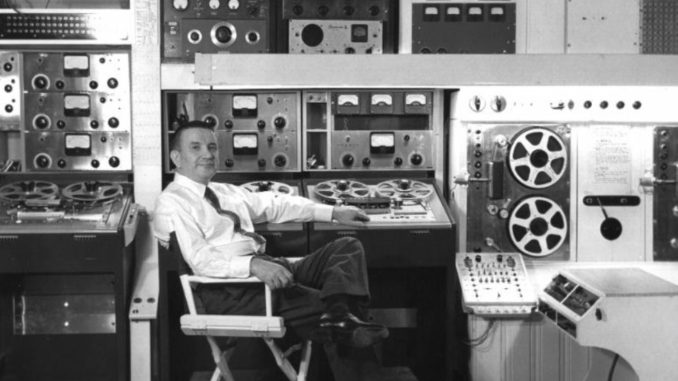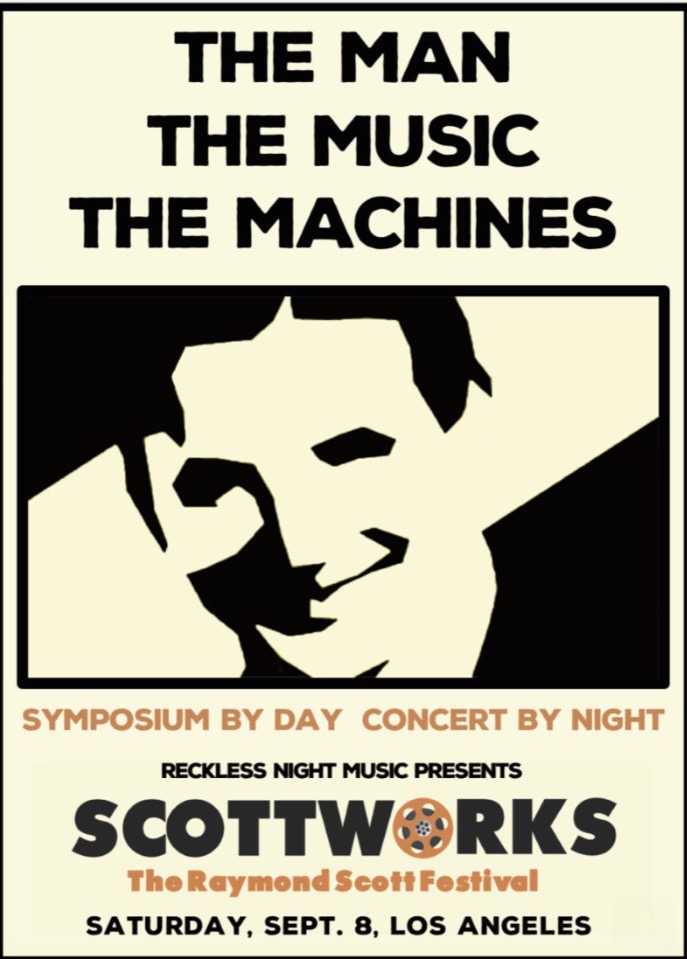
By JOHN DALY
Raymond Scott, the musician, inventor, and visionary mainly known for his cartoon scoring, will be feted on Sept. 8 at the Colony Theatre in Burbank. A festival called ScottWorks will be held on what would have been the jazz music innovator’s 110th birthday.
ScottWorks is presented by Reckless Night Music and Raymond Scott’s family. The festival will include a daytime symposium on topics that range from Scott’s 1930s jazz compositions to his 1960s electronic music inventions.
There will be presentations, panels, gallery displays, and interactive exhibits during the day, followed by a concert at night featuring live performances to celebrate Scott’s multi-dimensional music.
Scott’s musical and technological achievements have become more widely known over the past 20 years.
ScottWorks producers Stan Warnow and Deborah Scott Studebaker are committed to honoring their father’s impact on music, culture and technology.
“Raymond Scott was an innovator across many genres-he loved the work, but he was uncomfortable in the spotlight,” Studebaker said. “ScottWorks is a chance for us to illuminate our father’s creative legacy and recognize his place in modern history.”

Raymond Scott Envisioned Less Predictable Music
Raymond Scott (1908-1994), was born in Brooklyn as Harry Warnow, but changed his name to “Raymond Scott” because it had “good rhythm.” He led a six-man jazz group, which became popular in the late 1930s. Tired of the clichés of that era’s prevailing swing music, Scott envisioned compositions which were less predictable, with tempo and time signature changes but with jazz overtones.
Scott may be best known for his music, which is featured in cartoons, but he actually never wrote a note of cartoon music. His compositions, which were painstakingly crafted for the record-buying public, have over the years been incorporated into Looney Tunes and Merry Melodies, Ren and Stimpy, The Simpsons, Animaniacs and other popular animated productions.
While his music is instantly recognizable to anyone who has watched these cartoons, his inventions have had an equally galvanizing effect producing sounds in the 1960s that foreshadowed today’s electronic ambient and techno musical genres.
Robert Moog acknowleged Scott’s impact on electronic music.
“Raymond Scott was definitely in the forefront of developing electronic music technology and in the forefront of using it commercially as a musician,” Moog has said.
Programmed Intelligence
Raymond Scott’s sequencer-based Electronium, begun in 1959 and refined through the early 1970s, used programmed intelligence as a composition-performance tool for intuitive collaboration between man and machine.
In 1969, the Electronium caught the ear of Motown founder Berry Gordy, who visited Scott at his Long Island home to hear a demo and meet its creator. Gordy later placed an order for an Electronium, which he hoped would serve as an “idea generator” for Motown artists and producers. In 1972 Scott moved to Los Angeles after being named Motown’s Director of Electronic Research and Development. He would work for Motown for five years.
- Brian Kehew: Musician, historian, co-author of Recording the Beatles
- Byron Werner: the man who rediscovered Raymond Scott, leading to the early ’90s revival
- Darren Davison: Engineer with extensive technical knowledge of the Electronium from his five-year restoration project
- Dave Brown: 34 years at Tektronix working in Computer Graphics and Video & Networking. Now retired, has time for his hobbies-including a working version of the Raymond Scott Circle Machine that he’s bringing to the festival! Also volunteers at Tektronix Museum.
- Dr. Les Deutsch: NASA scientist, jazz musician, arranger of Scott compositions
- Hal Willner: Grammy-winning producer of albums by Lou Reed, Laurie Anderson, Lucinda Williams, and others; SNL sketch music adaptations, Executive Producer of the Raymond Scott CD Reckless Nights and Turkish Twilights
- Herb Deutsch: Co-inventor of the Moog synthesizer, 1964; Professor Emeritus of Music, Hofstra University; Raymond Scott colleague
- Hoby Cook: Scott Motown colleague and the only musician other than Scott to play and compose on the Motown Electronium
- Irwin Chusid: Raymond Scott historian/album producer, WFMU DJ, administrator for catalogs of Raymond Scott and Sun Ra
- Jack Hertz: Artist/programmer/synthesist;
producer of the Biography: Raymond Scott compilation; curator of the Encyclotronic electronic music archive - Jeff Winner: Raymond Scott historian/album & concert producer
- Jeremy Cohen: Leader of three-time Grammy-nominated Quartet San Francisco, who have recorded string quartet versions of Scott tunes
- Jeroen van der Schaaf: Managing Director, Basta Music
- Jerry Beck: writer, animation producer, Cal Arts college professor and author of more than 15 books on animation history. Founder of Animation Research and a former studio exec with Nickelodeon Movies and Disney.
- Skip Heller: Guitarist, singer, composer, producer, music journalist, historian; arranged Scott’s “Powerhouse” for the Bernie Mac Show
- Tom Rhea: Berklee College Electronic Music professor (ret.); Sr. Advisor, Electronic Music Education And Preservation Project; worked with Scott on electronic instrument marketing
